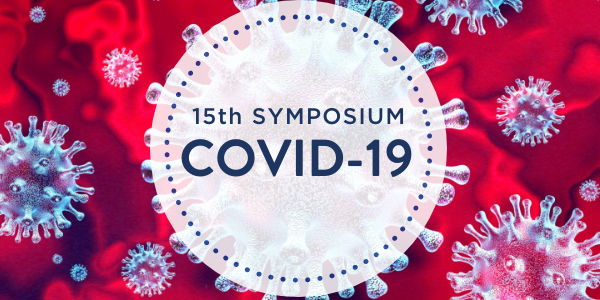NYMC and TCUS Host 15th COVID-19 Symposium
NYMC and TCUS presented the latest in possible treatments for the virus along with discussions regarding vaccine and mask mandates.

News about emerging COVID-19 treatments was at the forefront of the 15th edition of the COVID-19 Symposium series, presented by New York Medical College (NYMC) and Touro College and University System (TCUS) on October 14. Hosted by Edward C. Halperin, M.D., M.A., chancellor and chief executive officer of NYMC and provost for biomedical affairs at TCUS, the symposium examined brain fog, vaccinations for children, radiation therapy for COVID-19 pneumonia, the Molnupiavir oral capsule, the nursing situation in the U.S., and balancing individual rights to personal liberty and the community's right to maximize safety.
The Merck oral treatment for COVID-19 made headlines as a possible treatment seeking federal approval in recent weeks and its usage was broken down by Marisa A. Montecalvo, M.D., director of health services and professor of medicine, who presented “Molnupiravir: An Oral Potential Treatment for COVID-19.” “It looks like molnupiravir may provide an important, easy to use alternative [to monoclonal antibodies] to prevent hospitalization. Although treatment does need to be initiated soon after symptom onset.”
Dr. Halperin delivered a presentation on low dosage radiation to the lungs, that has been suggested could help COVID-19-induced pneumonia. Dr. Halperin explained in his presentation, “Low Dose Radiation Therapy for the Treatment of COVID-19 Pneumonia,” that the studies are still in very early stages and the radiation treatment could pose adverse long-terms side effects to patients such as tissue damage, cancer and virus mutations, which, Dr. Halperin said would force physicians to “weigh the ethical dilemma of this form of therapy.”
The term “Long COVID Syndrome” has become an increasingly used term as those with the virus have reported feeling lingering aftereffects, most predominantly, “brain fog.” Mill Etienne, M.D. '02, M.P.H., FAAN, FAES, vice chancellor for diversity and inclusion, associate dean of student affairs for the School of Medicine and associate professor of neurology and of medicine, presented “Post-Acute COVID-19 Syndrome: Focus on Brain Fog,” discussing other symptoms of long such as insomnia and how patients can try and fight it with diet and exercise and tips like making to-do lists to keep themselves on track. “The big difference with the long haul syndrome is that the fog is not going away,” Dr. Etienne said.
As the Pfizer-BioNTech COVID-19 vaccines have become available for younger populations, Tami Hendriksz, D.O., FACOP, FAAP, dean and chief academic officer, Touro University California College of Osteopathic Medicine, discussed the virus’ effect on children and different studies on vaccines in very young children for the Pfizer, Moderna and Janssen vaccines. “Hopefully soon, we’ll be able to protect everyone in our population from this virus,” Dr. Hendriksz said.
The COVID-19 pandemic has also highlighted staff shortages in nursing, and Sandra A. Russo Ph.D., R.N., chair, director of nursing, School of Health Sciences of Touro College, addressed the topic. Her presentation, “American Nursing “In Crisis” Exacerbated from COVID-19: Causes, Effects and Potential Solutions,” took a deeper look at the causes of the shortage, such as stress, pay and the United States’ high population of people over sixty years old. However, she felt that the shortage can be combated with strategic improvements and higher pay. “Nursing education may be shaped in new and exciting ways by solutions developed to meet the current and future faculty shortage,” Dr. Russo said.
John D. Loike, Ph.D., professor of biology, interim director of bioethics and humanities, then took a look at the legal, medical and Jewish perspective of vaccine and mask mandates. “From both a medical and Jewish perspective, mandating to wear masks is the right decision,” Dr. Loike said.
The webinar concluded with an engaging question and answer session on booster shots, vaccine dosage in children and the Merck oral treatment.
